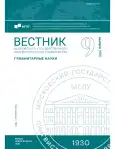Сonceptualization Features of Historical Memory in Documentary Film as Polycode Text
- Authors: Salomakhin A.Y.1
-
Affiliations:
- North-Caucasus Federal University
- Issue: No 9(903) (2025)
- Pages: 71-78
- Section: Linguistics
- URL: https://journal-vniispk.ru/2542-2197/article/view/342121
- ID: 342121
Cite item
Abstract
The article examines the conceptualization processes of historical memory in a polycode text based on the serial documentary film “Les Rois de France.” The purpose of the study is to determine the interaction features of visual, audio and verbal code systems that constitute the conceptual and semantic unity of the documentary. The identification of polycode means of conceptualizing historical memory was carried out using the linguopragmatic, semiotic, contextual and discourse analysis methods. The study showed that in the documentary, conceptualization of memory is implemented through visual symbols of power, historical iconography, reconstruction and chronicles, as well as emotionally colored musical and sound effects and expressive means, allowing pragmatically effective reconstruction of the past image as an integral part of cultural heritage of France.
About the authors
Anatoly Yuryevich Salomakhin
North-Caucasus Federal University
Author for correspondence.
Email: anatoly.salomakhin@gmail.com
PhD student, Lecturer at the Linguistic department
Russian FederationReferences
- Assmann, A. (2006). Der lange Schatten der Vergangenheit: Erinnerungskultur und Geschichtspolitik. München: C.H.Beck.
- Nora, P. et al. (1999). Frantsiya-pamyat’ = France-memory / P. Nora, M. Ozouf, J. de Puimeges, M. Vinok. St.Petersburg: Saint-Petersburg State University Publishing House. (In Russ.)
- Novospasskaya, N. V., Dugalich, N. M. (2022). Terminological system of the polycode text theory. Rusistika, 20(3), 298–311. (In Russ.)
- Sorokin, Yu. A., Tarasov, E. F. (1990). Kreolizovannye teksty i ikh kommunikativnaya funkciya = Creolized texts and their communicative function. Optimizatsiya rechevogo vozdeystviya (pp. 178–187): kollektivnaya monografiya. Moscow: Nauka. (In Russ.)
- Anisimova, E. E. (2003). Lingvistika teksta i mezhkul’turnaya kommunikatsiya (na materiale kreolizovannykh tekstov) = Text linguistics and intercultural communication (based on creolized texts). Moscow: Akademiya. (In Russ.)
- Gorozhanov, A. I., Guseynova, I. A. (2021). Prikladnyye aspekty analiza i interpretatsii tekstov (na materiale nemetskogo i russkogo yazykov): monografiya = Applied aspects of text analysis and interpretation (based on the German and Russian languages): monograph. Kazan: Buk. (In Russ.)
- Lotman, Yu. M. (1973). Semiotika kino i problemy kinoestetiki = Semiotics of Cinema and Problems of Cinema Esthetics. Tallinn: Eesti Raamat. (In Russ.)
- Evtushenko, O. V. (2012). Three types of thinking in discourse: past and present. Vestnik of Moscow State Linguistic University, 5(638), 145–153. (In Russ.)
- Fairclough, N. (1995). Critical Discourse Analysis: The Critical Study of Language. London: Longman.
- Hall, S. (2005). Culture, Media, Language. London: Taylor & Francis. 2d ed.
- Kortti, J. (2022). War, transgenerational memory and documentary film: mediated and institutional memory in historical culture. Rethinking History, 26(1), 93–112.
- Serebriakova, S. V., Kibkalo, R. I. (2024). Evaluation as a pragmatically significant marker of the author’s presence in astronomical popular scientific discourse (based on V.G. Surdin’s teхts). Proceedings of southern Federal University. Philology, 28(3), 72–83. (In Russ.)
- Guseynova, I. A., Gorozhanov, A. I. (2023). Ideology as a factor of translation: traditions in innovations. Vestnik of Volgograd State University. Series 2. Linguistics, 22(3), 67–76. doi: 10.15688/jvolsu2.2023.3.6. (In Russ.)
Supplementary files










